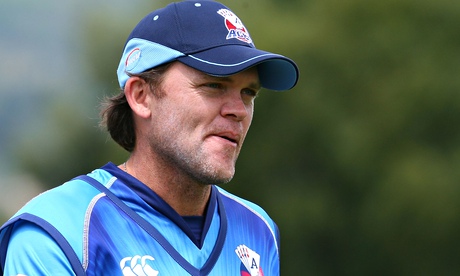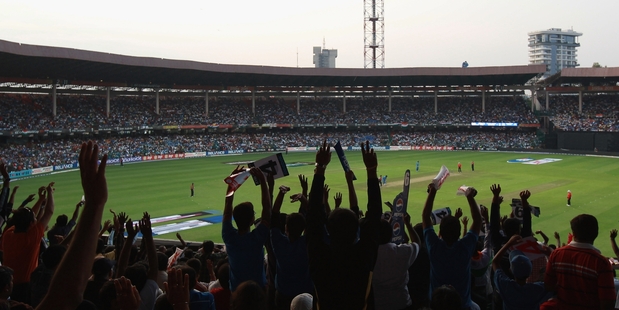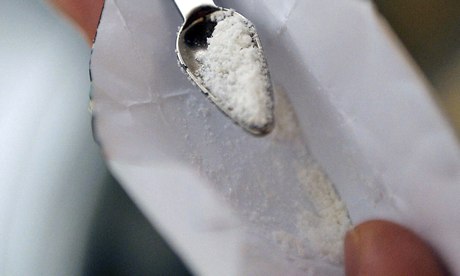
It is just not possible to bet on the minutiae of a match, including that of a bowler sending down a pre-designated no-ball. © Getty Images
Never meet a hero, they reckon. But what of a villain? Say hello to Vinay, from Bhopal, capital of the central Indian state of Madhya Pradesh. He is an illegal bookmaker, which also makes him a scourge of the game, and a malevolent, match-fixing mobster. Right?
When I met Vinay in a hotel lobby, the reputation of his brethren – there are estimated to be more than 70,000 bookies in India – preceded him. All, bar those who work at race courses (where gambling, so the argument goes, is based on skill rather than luck, and therefore socially acceptable) are illegal. It is said – by the ICC, corruption officers, national boards and player bodies – that the illegal bookies are dangerous men from the underworld. People fear them. And so, in truth, did I, as I waited for Vinay, nervously tapping my feet to inane pan-pipe music.
Yet when he arrived, I immediately felt at ease. There was no cloak, no dagger. His smile was brilliant, his handshake warm, his enquiry after my health genuine. We had already exchanged emails, Twitter messages and phone calls. What followed was a crash course in India’s vast gambling industry. Over several weeks as part of my research for a book on corruption in cricket, I would spend time living with him and his family, and watch him run his business (he also owned a construction firm); I would hide from the police, learn how bookies control betting markets, and hear of fixes before they happened. When we parted, I told Vinay of my initial apprehension. “Me?” he guffawed. “This is too much amusement for me. I hope you know me now, ya? But perhaps I understand why you were like this. Bookmakers in India are supposed to be all bad. No. We are trying to make our living in a corrupt country, and we do this by taking any opportunity we can.”
The backdrop to my visit was the sound of exploding myths. Chief among them was the notion that it is possible to place a bet on a no-ball, a misconception that called into question the precise nature of the conviction of Salman Butt, Mohammad Asif and Mohammad Aamer in the spot-fixing trial of November 2011 – though there is no doubt that the News of the World sting showed them to be corruptible. But preconceived notions about corruption in cricket simply collapsed, for it is just not possible to bet on the minutiae of a match: a batsman scoring a certain amount of runs, a fielder being placed in a particular position, a bowler operating from a specific end – or even sending down a pre-designated no-ball. Why? Because just as Indian bookies are not the threatening hoodlums of popular depiction, neither are they knuckledragging imbeciles. “Do you think we’re fools?” asked Vinay. “If someone says they want this no-ball bet for big monies, and I’m Ladbrokes in London, I tell them to go away. No bookmaker in the world takes this bet.”
One does not need to be invited into Vinay’s home to understand that any bookie worth his salt would suspect that this customer had inside information. Yet throughout the Southwark trial of the three Pakistanis and their agent, there was a wilful acceptance that the News of the World would have been able to place a bet on the timing of a no-ball, had they so wished. This was clear from the sentencing remarks by Mr Justice Cooke: “Bets could be placed on these no-balls in unlawful markets, mostly abroad, based on inside advance knowledge of what was going to happen… Individuals in India were making £40,000–£50,000 on each identified no-ball. On three no-balls, therefore, the bookmakers stood to lose £150,000 on each bet by a cheating punter.”
In fact, this is impossible. The illegal Indian market is highly organised and, crucially, uniform. It offers only four markets for its gamblers: match odds, innings runs (known as lambi), brackets (the number of runs scored in a certain amount of overs), and lunch favourite (essentially, betting that the team who are favourites at lunch in a Test, or at the innings break in a limited-overs match, will go on and win the game). In the case of the lambi and brackets, a spread is set for the number of runs to be scored, and gamblers bet over or under.
The odds for these markets are provided by four syndicates, who have reached the top of the food chain through their expertise in the field. They charge a fee to bookmakers to use those odds, then take a cut of the profits from all over the country. Think of the syndicates as wholesalers, and the bookies as convenience-store owners, who buy the goods, then sell them on. Vinay is what is known as a first-tier bookmaker. Occasionally, because he is highly regarded, he acts as one of the syndicate heads, who are often based in Mumbai or Dubai, sending out odds to bookies lower down the chain; bookmakers from the second, third or fourth tiers have fewer customers, and receive the odds via SMS, with the syndicate able to reach hundreds of them at once using bulk messaging software. “All bookies in India are connected,” said Vinay. “They will send on the prices to even more.”
Because the syndicates are so dominant, the potential for the manipulation of markets is obvious. And it is certainly more profitable than paying a bowler to overstep. “The Indian market is very big and powerful,” Vinay told me just before England’s One-Day International against India at Hyderabad in October 2011. “There are much smarter ways to manipulate betting. Look, I’ll show you.”
On his laptop he logged on to Betfair, the person-to-person betting exchange with more than four million customers around the globe. After it was announced India had won the toss, he sent updated odds to 200 bookmakers across the country. On the match-odds market, India were favourites at 1.95 (even money would be 2.00). These decimal odds translate into the traditional fractional odds used in the UK as 20-21: in other words, if you bet £21 you can win £20.
“Now watch how I move the Betfair market,” said Vinay. When he sends the SMS to his cohorts instructing them to lower the odds, they flood Betfair with money – or, to be precise, with people prepared to place bets at these odds. He explained: “It is currently India 1.95. Watch how they become 1.85 in line with our odds… wait, you’ll see here how it works… we want to get India short.” Vinay was keen to price India as short as possible because he knew most of his punters would back the home team. Since an Indian victory would have been certain to cost him money, he wanted to discourage punters from backing them. Seconds later, he chirped: “There, you see: India 1.85 now on Betfair. We have moved the market.” And all this from a text message which simply read: “India 85”.

Unfortunately for cricket and the ICC’s Anti-Corruption and Security Unit, some fixes are almost impossible to prove. © AFP
This, of course, is not corruption – just the sheer weight of (illegal) Indian money. Yet no matter what wagers are struck, the bookmaker and the syndicates are able to avoid losses by using betting exchanges to hedge their bets. For example, a bookie may have accepted a wager from any Tom, Dick or Hari of £10 on England to win at even money. This has the potential to cost the bookie £10. However, when England’s odds during the game drift to 6-4 (greater than even money) – either because momentum has shifted towards India, or because Vinay has manipulated the market from a hotel room in Bhopal – the bookie can lay off, or hedge, his bets. The original bet risks him £10. But by placing a wager himself on England at odds of 6-4 for £10, he stands to win £15 if he’s successful: £15 minus £10 is a guaranteed profit of £5. (In the case of an Indian win, Vinay would have hedged his position too, although – because of the amount of money wagered on India – he would be merely seeking to reduce his losses to a manageable level.) Now consider the potential when four or five figures are involved.
Hedging is not illegal, but it shows that corruption is not an exact science: there is more than one method and more than one protagonist. The assumption that it is largely bookmakers who fix matches would appear to be wrong. Vinay worries that punters close to players or officials do the fixing, costing him money. Yet there seems little doubt that the all-powerful syndicates have massive influence, as well as the funds and organisational ability, to fix elements of matches – or even the results themselves.
The bookies and the professional punter can be considered enemies, in the mould of the old-fashioned pork-pie-hat-wearing odds-maker and his traditional chancer customer. It is a war for inside information: who knows more? The only consistent loser is the less clued-up customer, who is in effect betting blind. The syndicate operates a subtle fix. By sending out false odds via their bookies, they tempt customers into taking them. Vinay gave the example of how, armed with prior knowledge that a well-known Test match in 2011 would not end in a draw – when a draw looked at one stage the only possible result – the odds were set so that more people would bet on the stalemate. This is a ruse that hundreds of thousands fall prey to, and the money tots up.
The professional punter can do likewise, but he is a simpler operator. His original way of making money from fixes, which would have been used in the days of Hansie Cronje – and before the betting exchanges were commonplace – is less sophisticated. It requires much poking and prodding of contacts up and down the country, hoping minions will then place the bets correctly. It is a system that primarily takes advantage of the sheer size of the industry: a few lakh in Mumbai (one lakh equals 100,000), a few more in Delhi, a few more somewhere else. Next week, mix it all up again in an attempt not to draw attention to the scale of the enterprise – and hope you don’t get found out.
“The punter will have his friends placing the bets all over,” said Vinay. “There is a big connection. Some punters are connected like the bookmakers are connected. If a punter has 50 friends, he can get 50 bets.” The aim of fragmenting his bets by placing many smaller ones instead of a couple of large ones is to prevent the bookmaker from suspecting inside knowledge. The subtle nature of the sting fuels the belief that a wide array of markets are available to bet on in India. But it is not because there is a betting market for fielding positions that a syndicate or punter has cajoled a captain into moving a fielder from third man (there is no such market). It is because, without a third man in the first ten overs of a one-day international, more runs are likely to be scored. This allows the syndicate to set false odds on a bracket, knowing that, if they offer runs in the first ten overs at, say, 70–75, most gamblers will bet under. Similarly, a punter who has a close friendship with a batsman might have arranged for him to score fewer than 25. This will give him an edge when it comes to the lambi, bracket and match odds. If it sounds like insider trading on the stock market, that is precisely what it amounts to.
Unfortunately for cricket and the ICC’s Anti-Corruption and Security Unit, it is almost impossible to prove. The fixes are so minute – at least in terms of the impact on the match result – as to be virtually undetectable. How, for example, could the ACSU prove in court that a batsman has scored deliberately slowly for just one over in a Twenty20 match to sate a syndicate or a punter playing the brackets?
But the ACSU do not help themselves by failing to grasp how the illegal market in India works. They were embarrassed when Ravi Sawani, their former boss, admitted in the Southwark trial he had not heard of the term “bracket”. They should also be pilloried for failing to grasp the nuances of spot-fixing, wrongly believing there are manifold markets for bookmakers or gamblers to exploit. Yet we should not simply criticise the governing body. Rarely are players, the collective, admonished. “It’s down to them to take ownership,” said an ACSU source. “A few players have said: ‘There should be more ACSU people.’ No, we should have 20 guys on the field naming the two who are at it.”
There is hope – but only a little. If India’s bookmakers were legalised, they would have to operate exactly like Ladbrokes or William Hill. That would mean an end to the credit system, where bookies accept customers on trust. Instead, they would need money in their account to wager. And to have an account, they would have to hand over their personal details. When accounts are kept and verified, you have a paper trail. If you have a paper trail, you have no rogue punters setting up fixes with their friends in cricket teams. At a stroke, the potential for corruption would be reduced by half.
Vinay is not convinced: “People say: ‘Legalise betting in India and fixing will stop.’ Yes. We are ready to pay tax. I’m tired of paying off the police. But it will not stop fixing. Never.”








